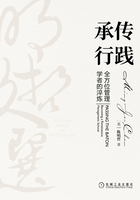
推荐序三
陈明哲教授文选推荐序[1]
这套重要的系列作品代表了国际知名企业战略学者、美国弗吉尼亚大学达顿商学院讲座教授陈明哲博士毕生的深远贡献。在这套文选中,陈明哲教授对战略管理学术研究与企业实践方面的核心议题提供了诸多洞见。更重要的是,他透过这套文选告诉我们,他如何身体力行地成为一位具有社会责任感与人文关怀的学者和老师,以及一名“反求诸己”、有德性的管理实务行践者。
明哲终其一生严于律己,致力于成为诸多领域中的典范。他的许多开创性研究与思想贡献都一一呈现在这套文选中,这套文选无疑将会成为企业战略管理领域的经典著作,在今后的历史长河中影响管理学学者和企业管理者。让我对这套文选中的三本书分别略抒己见。
在系列之一《承传行践:全方位管理学者的淬炼》中,陈教授指出了现今管理学领域中狭隘地、过度地聚焦于研究、教学或实践单一领域的贫瘠。他强调研究、教学与实践三者之间整合与融合的必要性。更重要的是,他展示了自己如何从三者的本质来进行互补与协同。其中,诸多示例的展示生动地描述了学者若仅专注于对任何单一路径的追求,可能会阻碍管理学的学术严谨性、实践相关性与深度。事实上,研究、教学与实践的整合一直以来被管理学者所忽视,管理学者将自己关在象牙塔内,对于现实中管理实践的挑战与发展漠不关心。这使得他们错失了许多机会,比如大学课堂或高管教育能够将管理学研究、教学与实践加以整合的机会。同样地,企业管理者日复一日地投身管理事务,忽略了从现状中跳脱出来,汲取管理学理论层面与理论洞察中的养分,因而陷入“见树不见林”的情境之中。在这套文选中,陈教授通过自身经历以及诸多发人深省的经典示例,向我们呈现出如何进行“全方位管理学者的淬炼”,并通过这些“淬炼”去更好地整合与联结当下研究、教学与实践之间的割裂,进而启发这三个领域的发展。这也对我们这些投身于学术研究、教学与实践的学术工作者提出了更高的要求。
在系列之二《动态竞争:后波特时代的竞争优势》中,陈教授作为动态竞争理论的主要创始人之一,系统地回顾了动态竞争理论的演化与发展。在动态竞争理论提出之前,战略管理的主要理论都采用静态的视角,这一视角使得企业战略管理研究脱离企业经营现实,特别是当分析企业之间你来我往的竞争行为时,这种静态视角的局限性尤为明显。在战略管理中开创性地提出动态竞争理论的这一过程中,陈教授和他的同事对企业战略管理思想的形成与实践发挥了极为重要的影响与推进作用。比如,陈教授首次在研究中提出“竞争决策组合”这个概念,在这个概念之下,竞争行为的简化、惯性以及一致性的起源和影响都得到了更全面的探讨。通过“竞争决策组合”等一系列研究,陈教授和他的同事让管理学者以及企业管理者得以更好地理解那些有效和无效的组织学习、组织模仿与组织变革的行为。
在后续研究中,陈教授基于期望–效价理论中的部分观点,开创性地提出“察觉–动机–能力”这一动态竞争理论的基本分析框架。这一分析框架几乎成为所有动态竞争理论学者的研究基石,其影响不仅源于它的理论内涵以及强大的预测能力,更重要的是,它将企业战略管理领域中两个极为重要却看似难以融合的理论(资源基础理论和波特的竞争理论)进行了完美的整合。
在“察觉–动机–能力”这一理论分析框架的基础上,陈教授提出了更具洞见的“关系视角”。他将动态竞争理论中从交易出发、两两对立的竞争视角,引向更为长期导向的关系视角。在关系视角中,更为广义的利益相关者(包括员工、客户、供应商和社群等)都被纳入分析框架当中。可以说,陈教授在动态竞争理论领域的一系列研究,是那些想要探寻与理解企业竞争行为的学者与实践者的必读经典之作。
从世界范围来看,管理学研究一直以来都被西方的管理学观点与视角所主宰。比如,西方的管理学研究视角重视竞争、破坏性创新与精英统治,强调对手而忽视伙伴,强调交易而忽视合作,强调短期思维而忽视长期思维。简言之,西方的管理学研究视角是一种狭隘的、赢者通吃的逻辑。与此相反,东方管理学研究与实践采用的是一种海纳式的、长远的、更为强调利益相关者之间联系的视角,当然这其中也包含着家长式管理、家族绑定、信任亲信等一些极具东方色彩的元素。
在系列之三《文化双融:执两用中的战略新思维》中,陈教授将他近年来开创性提出的文化双融理论及其应用做了翔实的呈现。文化双融理论强调整合看似对立或不兼容的两方(或多方)的优点,同时最大限度地摒弃各自的缺点。事实上,文化双融理论源自东方哲学思维中的“执两用中”,陈教授由此指出我们应当更好地整合东西方思想中的精华,从而避免二者取其一的极端,这种文化双融的思维不仅可以应用到企业的战略思考中,还可以应用到我们每个人的生活中。我们不难看出,陈教授始终在深思与反思人类行为与人文社会学领域的一些基本问题,始终“精一”地推动各种矛盾的协调与整合。陈教授毕生都在推动东西方管理学思想的“双融”,这对于管理学学术与实践的发展有着深远的影响与贡献。
我强烈推荐陈教授的这套书给大家,这套书将会帮助从学生、教授到企业管理者等各个行业与领域的人,更为有效地理解企业战略管理,并将这些理解应用于实践当中。
丹尼·米勒[2]
2020年3月于蒙特利尔高等商学院
附
Preface of “Selected Works of Ming-Jer Chen”
This vital series of works marks a lifetime of profound contribution by Professor Ming-Jer Chen of the Darden School of the University of Virginia, one of the world's great scholars of strategy. In this collection, Ming-Jer Chen has provided insight into vital topics in strategic management scholarship and practice. More importantly, he tells us what it takes to lead a life of socially responsible academic research and teaching, and lays bare the core elements of what it takes to become a reflective and moral business practitioner.
Ming-Jer has devoted his life to and served as a role model in all of these spheres. Happily, his pathbreaking contributions are highlighted in each of the three thematic works in this important collection, which no doubt will serve as classics in strategic wisdom for scholars and managers alike for many decades to come. Please let me say a little about each of the volumes in the collection.
In the first volume of this series Passing the Baton: Becoming a Renaissance Management Scholar, Professor Chen highlights the poverty of an exclusive and excessive focus only on research, teaching, or practice. He argues for the integral connections among these vital areas of society, namely, scholarship, instruction and the conduct of management. More importantly, he demonstrates their essential complementary and synergy among these domains. In so doing, he vividly demonstrates that the pursuit of any one single path hobbles its relevance, rigour and depth. The importance of complementarity has been neglected by too many academics who have failed to become informed by real world challenges and developments, and have failed thereby to enrich and in turn become enriched by their university classroom and executive education experiences. It has also been ignored by too many managers who are so focussed on the day to day tasks at hand that they neglect to learn from more conceptually fundamental strategic insights and thereby fail to “see the forest for the trees”. Using poignant real-world and personal examples and deep perspective, Ming-Jer Chen shows how “becoming a Renaissance management scholar” can bridge the current chasms that exist between teaching and research, and research and practice, thereby enlightening all three domains. In so doing he raises the bar for all of us working in academic research, instruction, and executive practice.
In the second volume of this series, Competitive Dynamics: Competitive Advantage in the Post-Porter Era, Professor Chen traces a scholarly trajectory of evolution, beginning with his roots as one of the primary founders of competitive dynamics. Before the advent of the competitive dynamics perspective, research in strategy was static, too far removed from the realities and give and take of true rivalry——of competitive action and response.In pioneering this critical area of research, Professor Chen, along with his colleagues, significantly advanced strategic thinking and practice. He initiated research into hitherto neglected competitive repertoires——and the contextual sources and performance consequences the simplicity, inertia, and conformity characterizing such multifaceted repertoires. In so doing, he and his colleagues have derived important insights into the nature of functional and dysfunctional organizational learning, imitation, and change.
In later work, based in part on an expectancy-valence perspective, Professor Chen developed his Awareness-Motivation-Capability model which was to serve as a foundational framework for legions of competitive dynamics scholars. The widespread influence of this model stemmed not only from its elegance and predictive power, but also because it reconciled the two dominant, but seemingly disparate, strategic perspectives of the day: Porterian competitive analysis and the ever-popular resource-based-view.
Ming-Jer then worked to update this model by proposing a more long-term oriented relational approach, taking the field of head-to-head competition from a transactional portrayal of dual opponents, to a longer-term relational perspective encompassing a far wider range of stakeholders——employees, customers, suppliers, and the community at large. At the present time, Ming-Jer's work in competitive dynamics is indispensable to those who wish to be both scholars and practitioners of effective strategic competition.
The field of management scholarship in much of the world has been dominated by a Western viewpoint and perspective——one of supposed competition, creative destruction and meritocracy, but also one of rivalry over cooperation, transactions over relationships, and short-term versus long-term thinking——in short, a rather narrow, winner-takes all logic. At an opposite end of the spectrum, Asian management scholarship and practice has tended towards a broader, longer-term, more relational perspective——but also sometimes one of paternalism, familial favoritism, and even cronyism.
In the third volume of this series, Ambiculturalism: Strategic Middle-Way Thinking for the Modern World, Ming-Jer Chen presents a model that embraces the best of both worlds while avoiding its less salutary aspects. He outlines in revealing detail a middle way that avoids the excesses, but exploits the advantages, of both Eastern and Western thought as they apply not only to strategic thinking, but to life itself. In so doing he celebrates the “power of one”——the necessity to integrate, reflect, reconcile, and think more deeply about the underlying multifaceted tensions and characteristics underlying human conduct, and fundamental humanity. Ming-Jer Chen thereby brings to Asian and Western scholars alike, a foundation for enriching their scholarly and practical contributions.
I cannot recommend this work more highly for students, professors, and managers at all levels to help them become more effective and more relevant in their lifelong strategic pursuits, very broadly defined.
Danny Miller
HEC Montreal
Montreal, March 2020
[1] 后附此推荐序的英文版Preface of “Selected Works of Ming-Jer Chen”。
[2] 丹尼·米勒教授是全球最为高产且极具影响力的战略管理学者(陈明哲教授曾说,作为战略管理学者,米勒教授是目前全球顶尖者中的顶尖者)。这里有一个有趣的小故事:陈明哲教授之前从未和米勒教授提到这三本中文书,但当米勒教授收到这套中文书稿并受邀撰写推荐序后,他很快就发来了这篇推荐序。从他的推荐序中可以看出,他不仅非常了解书中的内容和思路,而且似乎他也懂中文!